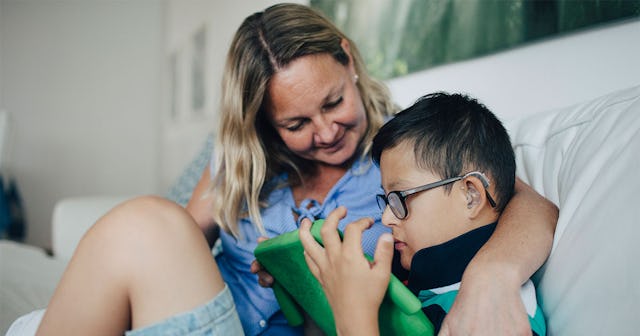The Problem (For Me) With Being Pro-Choice And The Mother To A Boy With Down Syndrome

I am pro-choice. I am also mother to a 12-year-old boy with Down syndrome. At first blush those two things don’t seem to be cause for conflict, but consider that somewhere around 67% of pregnancies with Down syndrome diagnoses are aborted. This is just one symptom of the way in which the world devalues my son. Because of this, I struggle with my pro-choice values.
I believe that bodily autonomy is a basic human right. As such, a woman ought not be forced to be pregnant. A person with an intellectual disability like my son ought to have the opportunity to live where he chooses, as he chooses, free from institutionalization or other horrors such as mandated sterilization. At this basic level, disability advocacy and support for abortion rights march in lock step. Pro-choice as such extends to a multidimensional array of human activity.
However, too often, the pro-choice movement as a political entity fails to focus on bodily autonomy as the fundamental reason that abortion should be legal. Too often, we hear that abortion is necessary for specific cases — such as rape, health of the mother, or disability of the fetus. This is where I struggle.
SolStock/Getty
When my wife was eight weeks pregnant with our son, he was diagnosed with a heart condition that is almost exclusively present in children with Down syndrome. We were doubly devastated, by both his malformed heart and his almost certain intellectual disability. However, based on an agreement we had before the pregnancy ever occurred, we immediately told the diagnosing doctor that we were not considering termination. Instead of accepting our choice, he pressured us to have amniocentesis with the idea that a confirmed diagnosis would lead to an abortion. My own psychiatrist believed the prognosis was so dire that she recommended abortion or institutionalization. Our story is a familiar one among parents of children with Down syndrome.
Why did we keep the pregnancy? I believe in fate and karma and that whatever child we had would be perfect for us. It didn’t hurt that we had good health insurance and the economic resources to provide for a child with extra needs. I support the fact that abortion was an option, but resent that it was portrayed by medical people and the pro-choice movement itself as an almost automatic conclusion to a Down syndrome diagnosis. The people who push that line of reasoning are often completely ignorant of what life with a child with Down syndrome is actually like. The narrative is built on fear and ignorance.
In reality, my life with my son is full of both unique challenges and benefits. At twelve, he is mostly nonverbal, yet communicates much through his emotions. He has a wonderful sense of humor and our house is often filled with laughter. Academics are a struggle, but the silver lining is that, after a life of buying into achievement-based culture, I no longer worry about things as mundane as standardized tests and report cards. I am far more interested in his growth as a caring friend. His intelligence is in his unwavering ability to be mindful — as our pandemic quarantine creeps into the second year he still finds daily happiness in small acts of playing on his swing or trampoline.
SDI Productions/Getty
No one in the medical community offered this breadth of vision of what life with our son might be like. Instead they peddled fear and dread. The pro-choice movement does the same every time they declare disability to be one of the most compelling reasons for abortion.
The unfortunate truth is, other people’s attitudes towards my son are the most difficult part of raising him. When he was an infant we struggled mightily to find daycare that would accept him. Schools have often underestimated his potential, offering services that did not meet his needs. Children and adults alike stare at him when we are out in the community. The pro-choice movement’s attitude towards disability is both symptom and cause of this social bias.
What do I want? First I’d simply like the pro-choice activists to stop using disability to make their case. Why is aborting a fetus with a Down syndrome diagnosis less controversial or more marketable than simply stating that a woman has a right to control her own body, for whatever reason she determines?
Secondly, I’d like the pro-choice movement to embrace the idea that choice also means receiving unbiased information about any prenatal diagnosis. When the medical community pushes false narratives about the tribulations of life with Down syndrome women are not enabled to make a truly informed choice about whether to keep the pregnancy.
We should provide women with judgment free data and then leave them to make the best choice for themselves.
This article was originally published on